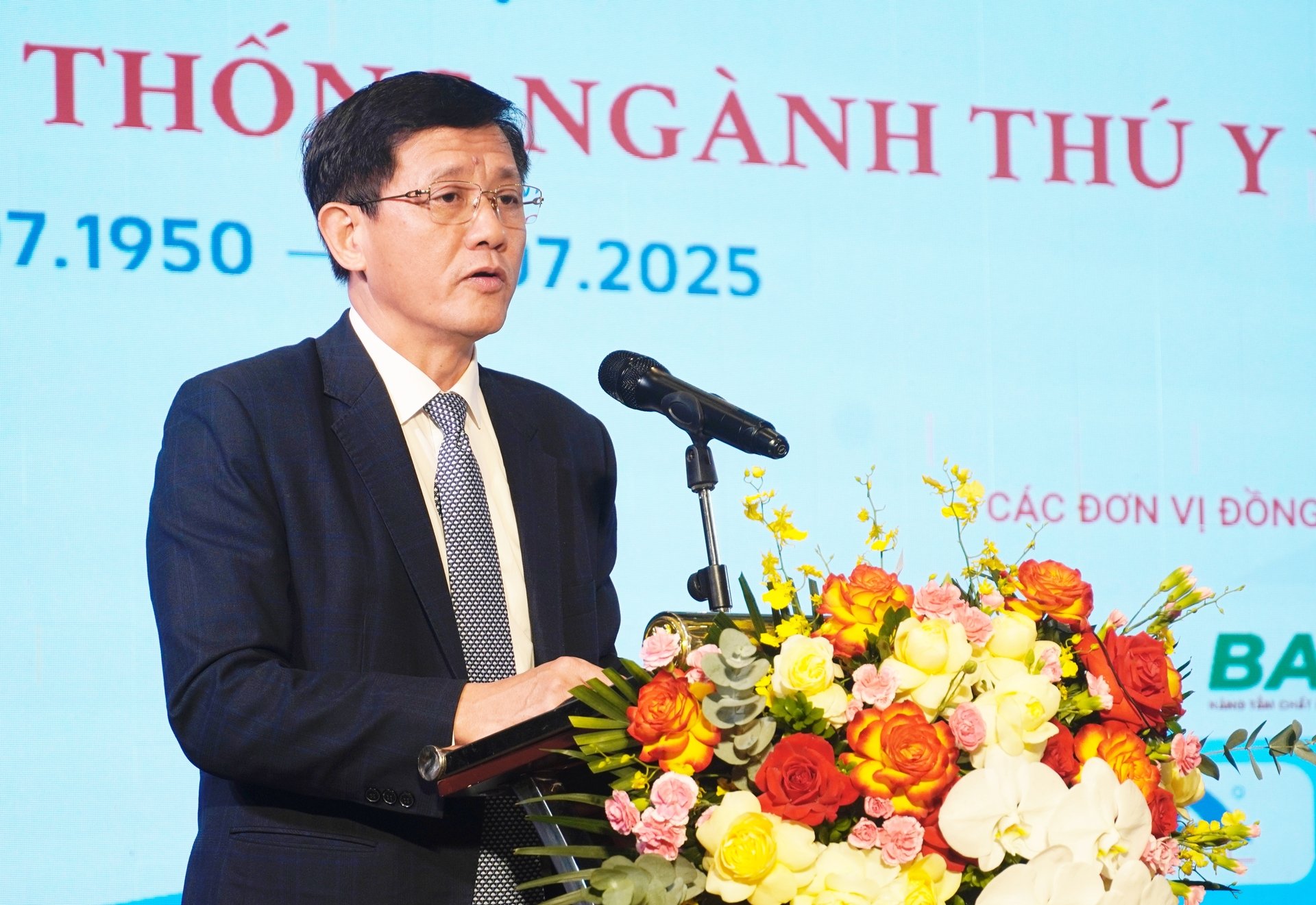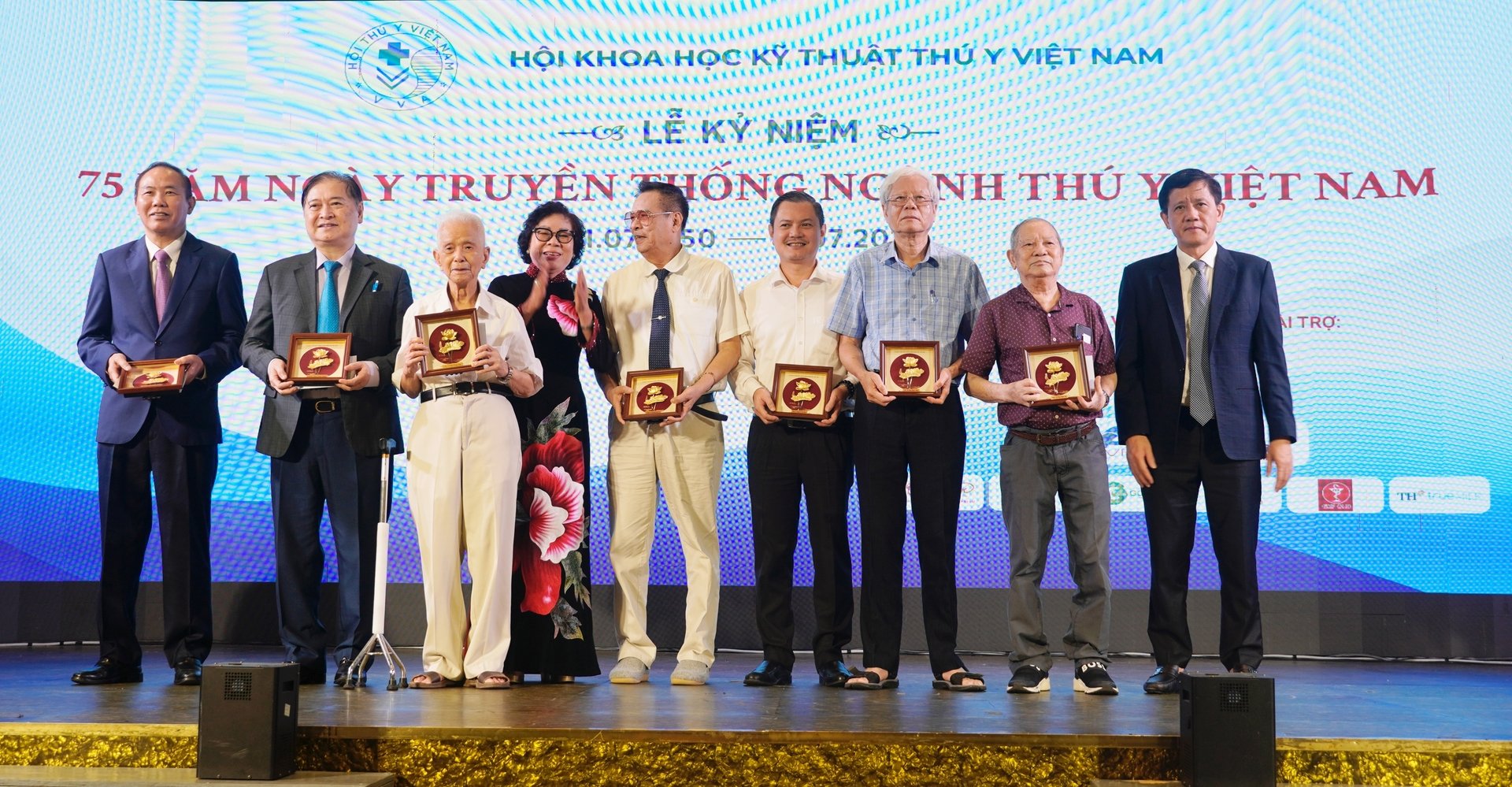December 23, 2025 | 14:37 GMT +7
December 23, 2025 | 14:37 GMT +7
Hotline: 0913.378.918
December 23, 2025 | 14:37 GMT +7
Hotline: 0913.378.918
The 75th anniversary of the Vietnamese veterinary sector’s traditional day was recently held on the morning of July 11 in Hanoi, organized by the Vietnam Veterinary Science and Technology Association. At the event, Duong Tat Thang, Director of the Department of Livestock Production and Animal Health (Ministry of Agriculture and Environment), reviewed the historical milestones of the Vietnamese veterinary sector.

Duong Tat Thang, Director of the Department of Livestock Production and Animal Health, made a speech at the anniversary of the Vietnamese veterinary sector’s traditional day. Photo: Hong Tham.
“Exactly 75 years ago, on July 11, 1950, while the country was still immersed in the flames of resistance war, President Ho Chi Minh signed Decree No. 125-SL on the eradication of livestock epidemics. This was one of the important legal documents of the Vietnamese Government regulating the prevention of animal diseases.
“On that basis, the Vietnamese veterinary sector has gradually stabilized its organization, closely followed the political tasks in each historical period and contributed to the overall development of the country,” said the leader of the Department of Livestock Production and Animal Health.
From then on, overcoming thousands of difficulties and challenges, generations of veterinary staff have constantly strived and actively contributed to the protection and development of livestock and poultry, ensuring disease safety, food safety, and public health.
The establishment of the Pasteur Institute Nha Trang by Dr. Alexandre Yersin in 1894 can be considered one of the most important milestones in the history of Vietnam's veterinary sector. During that period, research on products and serums to cure cattle plague began, followed by studies on vaccines to prevent important diseases in livestock.
Classical swine fever vaccine and dog rabies vaccine were typical examples. On average, over 6 million doses of vaccine and 80,000 doses of various antisera were produced each year, making an important contribution to disease prevention and control work at that time.
On November 14, 1945, immediately after the success of the August Revolution, the Government Council issued a Resolution to establish the Ministry of Agriculture, including the Department of Animal Health - Livestock Production - Fisheries (Decree No. 65-SL dated December 4, 1945).
On May 8, 1946, President Ho Chi Minh signed Decree No. 62 regulating the Departments under the Ministry of Agriculture, and at the same time appointed Doctor Pham Van Huyen as Director of the Department of Animal Health - Livestock Production - Fisheries (Decree 63).
On April 26, 1956, the Ministry of Agriculture and Forestry, the Ministry of Home Affairs, and the Ministry of Finance jointly issued Decree No. 03LB/ND, establishing the Veterinary Station (the predecessor of the current Sub-Departments of Livestock Production and Animal Health and Animal Quarantine Stations).
Between 1956 and 1963, the Ministry of Agriculture and Forestry reorganized the Office of Livestock Production and Animal Health into the Department of Livestock Production and Animal Health to meet the needs of livestock production and development and prevent livestock and poultry diseases.
In 1966, the Department of Animal Health was established based on separation from the Department of Livestock Production and Animal Health.

The Vietnam Veterinary Science and Technology Association honors outstanding individuals who have made many positive contributions to the veterinary sector in recent times. Photo: Hong Tham.
The Veterinary Ordinance was first issued in 1993, marking the growth of Vietnam’s veterinary sector. Its four goals were developing production, protecting public health, protecting the environment, and contributing to building a rule-of-law nation. The Veterinary Ordinance was later amended and supplemented in 2004.
In June 2015, at the 9th session of the 13th National Assembly, the Government passed the Law on Animal Health. This was a very important legal basis for management in terms of protecting animal health, contributing to safeguarding public health, and the ecological environment.
Most recently, in the process of implementing Resolution 18 of the Central Committee on continuing to innovate and reorganize the apparatus towards streamlining, efficient and efficient operations, on March 1, 2025, the Ministry of Agriculture and Environment issued Decision No. 32/QD-BNNMT stipulating the functions, tasks and powers of the Department of Livestock Production and Animal Health, on the basis of merging the Department of Livestock Production and the Department of Animal Health.
On July 12, 2005, to recognize the contributions and promote the role and tradition of the veterinary sector, the Prime Minister issued Decision No. 664/QD-TTg, designating July 11 as the "Traditional Day of the Veterinary Sector".
Implementing the provisions of the law on animal health, the system of specialized veterinary agencies was formed from the Central to the two-level government, which is the provincial and communal levels. Before the organization of the two-level government, Vietnam had a total of 275 Livestock Production and Animal Health Stations under the management of the Sub-Departments and 348 Agricultural Service Centers under district-level management.
With its important achievements and contributions to the overall development of the country, the veterinary industry has received many noble awards from the Party and the State such as: The Order of Ho Chi Minh, Order of Independence, Labor Orders of various ranks, Resistance Medal; Title of Hero of the People's Armed Forces, as well as noble awards from international organizations and other countries.
Translated by Samuel Pham

(VAN) In 2025, An Giang's agriculture achieved positive results, highlighted by stable rice production and the effective implementation of the 'One Million Hectares of High-Quality, Low-Emission Rice' project.

(VAN) Private sector will be a powerful force for investment and innovation to share solutions for nature conservation and biodiversity restoration.
/2025/12/18/4844-4-223614_595.jpg)
(VAN) Building on the 'Large-Scale Rice Field' project, An Giang is developing high-quality rice raw material zones, strengthening consumption linkages, and standardizing processes to meet market requirements.

(VAN) With support from KOICA, livestock sector is developing the regulatory framework for management based on South Korea’s experience.
/2025/12/17/0042-2-075234_14.jpg)
(VAN) In Vinh Long, high-quality, low-emission rice models are being scaled up from cooperatives, helping reduce production costs, increase farmers' incomes, and protect the environment.

Professor Nguyen Duc Ngu, the third generation of leaders since the establishment of Vietnam’s Hydrometeorology sector has witnessed and lived through the long arc of its development.

(VAN) Climate change, saline intrusion, and unsustainable farming practices are depleting agricultural land in the Mekong Delta. Restoring soil health is a key solution for the future of agriculture.